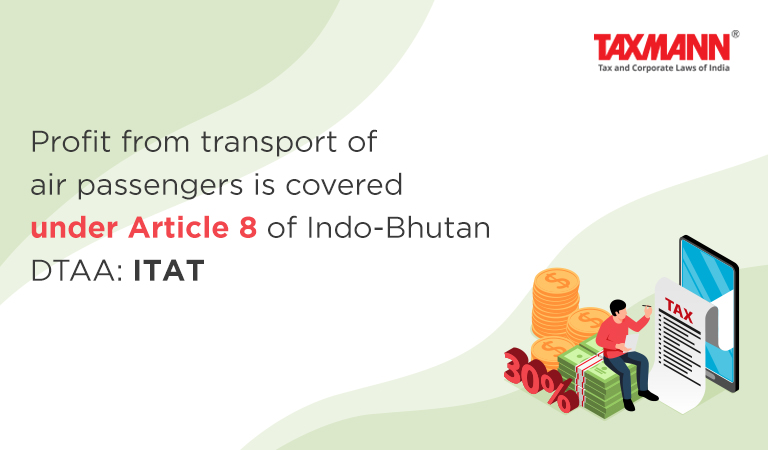Profit from transport of air passengers is covered under Article 8 of Indo-Bhutan DTAA: ITAT
- Blog|News|International Tax|
- 2 Min Read
- By Taxmann
- |
- Last Updated on 3 January, 2023

Case Details: DCIT v. Tashi Air (P.) Ltd. - [2022] 145 taxmann.com 511 (Kolkata-Trib.)
Judiciary and Counsel Details
-
- Sanjay Garg, Judicial Member & Dr Manish Borad, Accountant Member
- Manish Kanojia, CIT & Smt Ranu Biswas, Addl. CIT for the Appellant.
- Dipayan Basu, AR for the Respondent.
Facts of the Case
The assessee was an Airline having its establishment in Bhutan. It claimed that income from the sale of tickets to air passengers, insurance and fuel charges, etc. in India was taxable in Bhutan only. However, Assessing Officer (AO) held that as the assessee was having a permanent establishment in India, income was taxable in India as per provisions of section 9.
The Commissioner (Appeals) had accepted the contention of the assessee that since its place of effective management (POEM) had been in Bhutan, as per article 8 of Indo Bhutan Double Taxation Avoidance Agreement [DTAA] its income from air transport was taxable in Bhutan only.
Aggrieved-AO filed the instant appeal before the Tribunal.
ITAT Held
The Kolkata Tribunal held that article 8 of the Indo Bhutan DTAA is more beneficial to the assessee. Thus, the profits derived by the assessee from the operation of ships or aircraft in international traffic are liable to be taxed in the contracting state in which its place of effective management of the enterprise is situated, which undisputedly is Bhutan.
The term “Profits derived from the operation of ships or aircraft in international traffic”, in DTAA is exhaustive enough not only to include air passengers but also mail, livestock, or goods.
There was nothing mentioned in the India-Singapore DTAA to make an inference that the profits from the transport of air passengers should not be covered under Article 8 of the Indo-Bhutan DTAA.
List of Cases Reviewed
-
- Union of India v. Azadi Bachao Andolan [2003] 132 Taxman 373/263 ITR 706/184 CTR 450 (SC) (para 5) followed.
List of Cases Referred to
-
- Union of India v. Azadi Bachao Andolan [2003] 132 Taxman 373/263 ITR 706/184 CTR 450 (SC) (para 5).
Disclaimer: The content/information published on the website is only for general information of the user and shall not be construed as legal advice. While the Taxmann has exercised reasonable efforts to ensure the veracity of information/content published, Taxmann shall be under no liability in any manner whatsoever for incorrect information, if any.

Taxmann Publications has a dedicated in-house Research & Editorial Team. This team consists of a team of Chartered Accountants, Company Secretaries, and Lawyers. This team works under the guidance and supervision of editor-in-chief Mr Rakesh Bhargava.
The Research and Editorial Team is responsible for developing reliable and accurate content for the readers. The team follows the six-sigma approach to achieve the benchmark of zero error in its publications and research platforms. The team ensures that the following publication guidelines are thoroughly followed while developing the content:
- The statutory material is obtained only from the authorized and reliable sources
- All the latest developments in the judicial and legislative fields are covered
- Prepare the analytical write-ups on current, controversial, and important issues to help the readers to understand the concept and its implications
- Every content published by Taxmann is complete, accurate and lucid
- All evidence-based statements are supported with proper reference to Section, Circular No., Notification No. or citations
- The golden rules of grammar, style and consistency are thoroughly followed
- Font and size that’s easy to read and remain consistent across all imprint and digital publications are applied



 CA | CS | CMA
CA | CS | CMA
